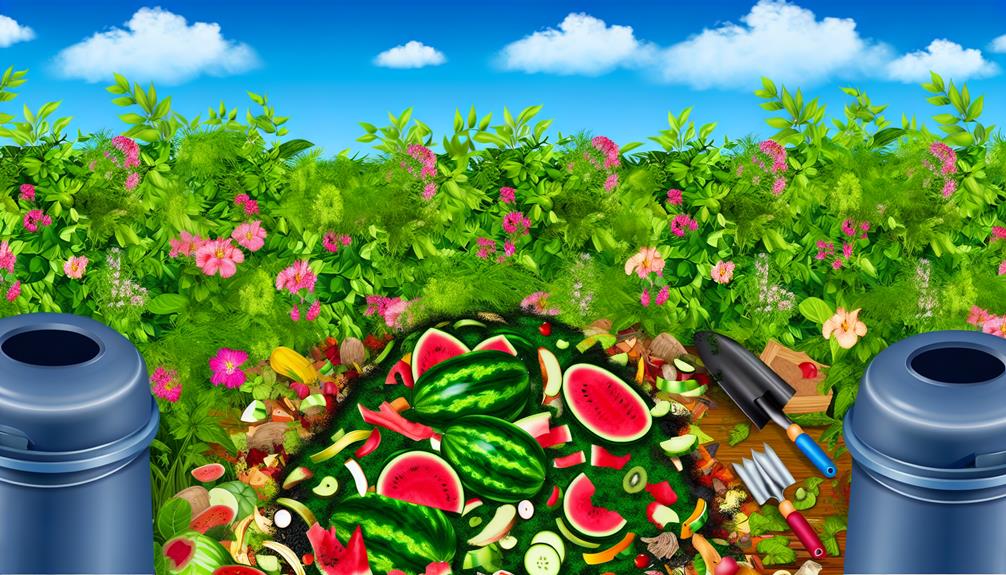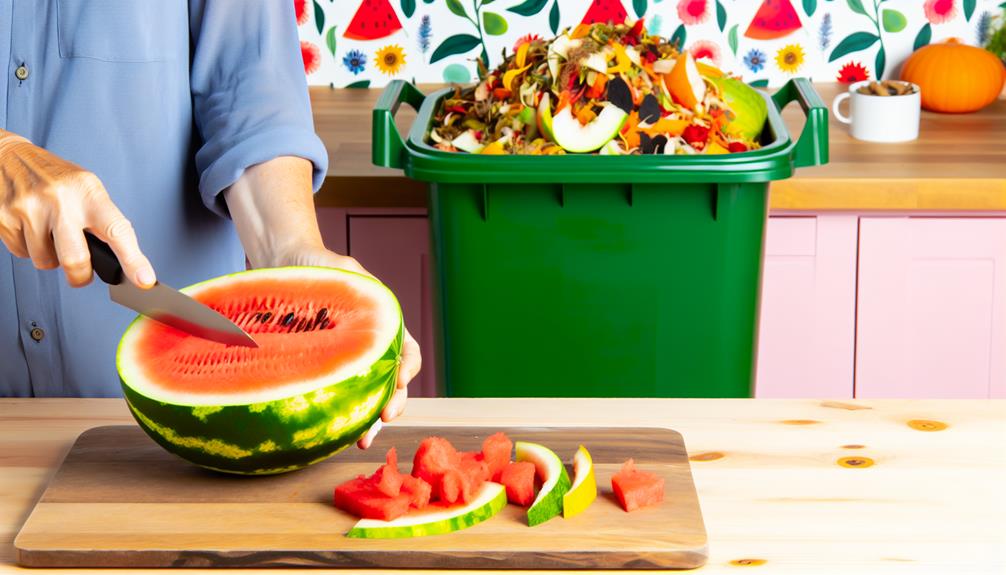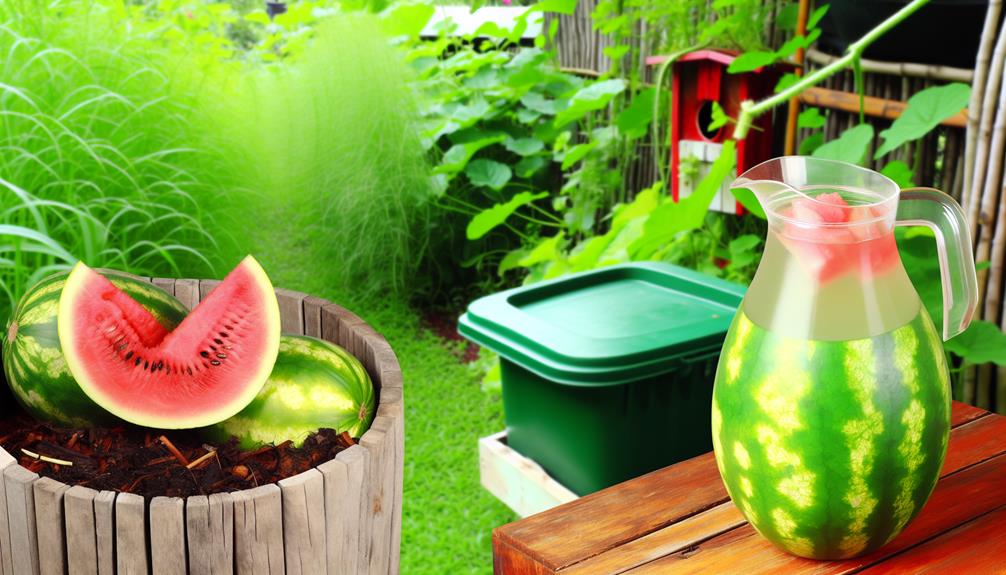

You can compost watermelon to enhance your soil’s health and nutrients. Start by cutting the rinds and flesh into small pieces for faster decomposition. Due to its high moisture content, you’ll need to balance the compost by adding dry materials like leaves or straw. This helps guarantee your pile from becoming too wet and attracting fruit flies.
Regularly turn the pile to guarantee even breakdown and monitor moisture levels. Removing the seeds is also a good idea to avoid germination in the compost. By following these steps, you’ll efficiently compost watermelon and maintain a healthy compost pile. Keep exploring to optimize your composting process.
Composting watermelon often boosts soil health by adding essential nutrients and improving moisture retention. When you compost watermelon rinds and flesh, you’re enriching your soil with valuable organic matter. This not only enhances the soil structure but also introduces crucial nutrients that plants need to thrive. Plus, watermelon has a high water content, which helps in retaining moisture in the compost and, subsequently, in your garden soil.
By composting watermelon, you’re also contributing to significant waste reduction. Instead of throwing watermelon scraps into the trash, where they’ll end up in a landfill, you can transform them into nutrient-rich compost. This not only reduces the waste you produce but also closes the loop of organic recycling, creating a more sustainable environment.
To get the most out of composting watermelon, make sure you cut the rinds into smaller pieces. This speeds up the decomposition process. Mixing the watermelon pieces with other compost materials like dry leaves or straw can help balance the moisture levels and avoid a soggy compost pile.
Also Read: Can You Compost Blood?
Despite its many benefits, you’ll encounter some challenges when composting watermelon. One of the main issues is its high moisture content, which can make your compost pile too wet. A soggy pile can lead to unpleasant odors and slow decomposition.
Additionally, watermelon can attract fruit flies, which can become a nuisance.
To manage these challenges, consider the following tips:
Also Read: Can You Compost Body Wash?
To guarantee watermelon for composting, start by cutting the rinds into smaller pieces. Smaller pieces decompose faster, making your composting process more efficient. Use a sharp knife to cut the watermelon rind into chunks about one to two inches in size. This size helps the microorganisms in your compost break it down more easily.

Next, focus on removing seeds. While seeds can compost, they may sprout and cause unwanted plants in your compost pile. To avoid this, take a moment to remove as many seeds as possible from the watermelon flesh. You can do this by cutting the watermelon into manageable chunks and scooping the seeds out with a spoon or your fingers.
After you’ve cut the rinds and removed the seeds, consider chopping up the watermelon flesh into smaller pieces as well. The smaller chunks will mix better with other compost materials, promoting faster decomposition.
Also Read: Can You Compost Black-Eyed Peas?
Now that you’ve prepared your watermelon scraps, it’s important to balance your compost pile with a mix of greens and browns for optimal decomposition. Achieving the right compost ratios is essential. Watermelon scraps are considered ‘greens’ because they’re rich in nitrogen. To counterbalance these, you’ll need to add ‘browns,’ which are materials high in carbon.
Maintaining a proper green-brown balance guarantees that your compost pile breaks down efficiently and doesn’t become too wet or too dry.
Here’s how you can balance your compost pile effectively:
Also Read: Can You Compost Celery?
Instead of just composting, you can repurpose watermelon scraps in several creative and practical ways. By doing so, you not only reduce waste but also create delicious and useful products. For instance, you can transform watermelon rinds into tasty snacks like rind pickles. Simply peel the green skin, slice the white rind, and pickle it with your favorite spices. Rind pickles not only taste great but also add a revitalizing twist to your meals.

Another excellent use for watermelon scraps is to make invigorating watermelon smoothies. Blend the leftover flesh with some ice and a splash of lime juice for a hydrating drink. You can even freeze the blended mix into popsicles for a cool treat on hot days.
Here’s a quick guide to inspire you:
| Use | Ingredients Needed | Instructions |
|---|---|---|
| Rind Pickles | Watermelon rind, spices | Peel, slice, and pickle with spices |
| Watermelon Smoothies | Watermelon flesh, ice, lime juice | Blend and serve over ice |
| Popsicles | Watermelon puree | Freeze blended watermelon flesh |
| Fruit Salad | Watermelon chunks, other fruits | Mix with other seasonal fruits |
Yes, you can compost watermelon seeds along with the rind and flesh. Just be aware that seed germination might occur. The nutrient content they add is beneficial, and sharing this practice helps build a sustainable community.
Watermelon’s decomposition rate in compost depends on temperature effects. In warm, well-maintained compost, it can break down in 2-3 weeks. Cooler conditions slow the process. You’ll feel connected to nature by composting your watermelon.
Yes, you can compost watermelon with mold. Mold toxicity isn’t a major concern in composting. Just make sure it’s well-mixed to promote healthy decomposition. You’re contributing to a healthier planet, so don’t worry!
You should compost watermelon in the summer for best seasonal benefits. Compost timing in warm months accelerates decomposition, enriching your compost faster. Join your community in sustainable practices by timing your composting efforts wisely.
Yes, composted watermelon can attract pests to your compost pile. Use compost covers and natural pest deterrents to manage this. By doing so, you’ll create a welcoming, pest-free environment for your composting community.
To sum up, composting watermelon is highly beneficial for your garden. You’ll need to manage its high water content by balancing it with dry, carbon-rich materials. Chop the rinds and flesh into small pieces to speed up decomposition. Always monitor your compost pile to make sure it’s not too wet.
If composting isn’t feasible, consider using watermelon scraps for other purposes like animal feed or garden mulch. Follow these tips for a healthier, more efficient composting process.
